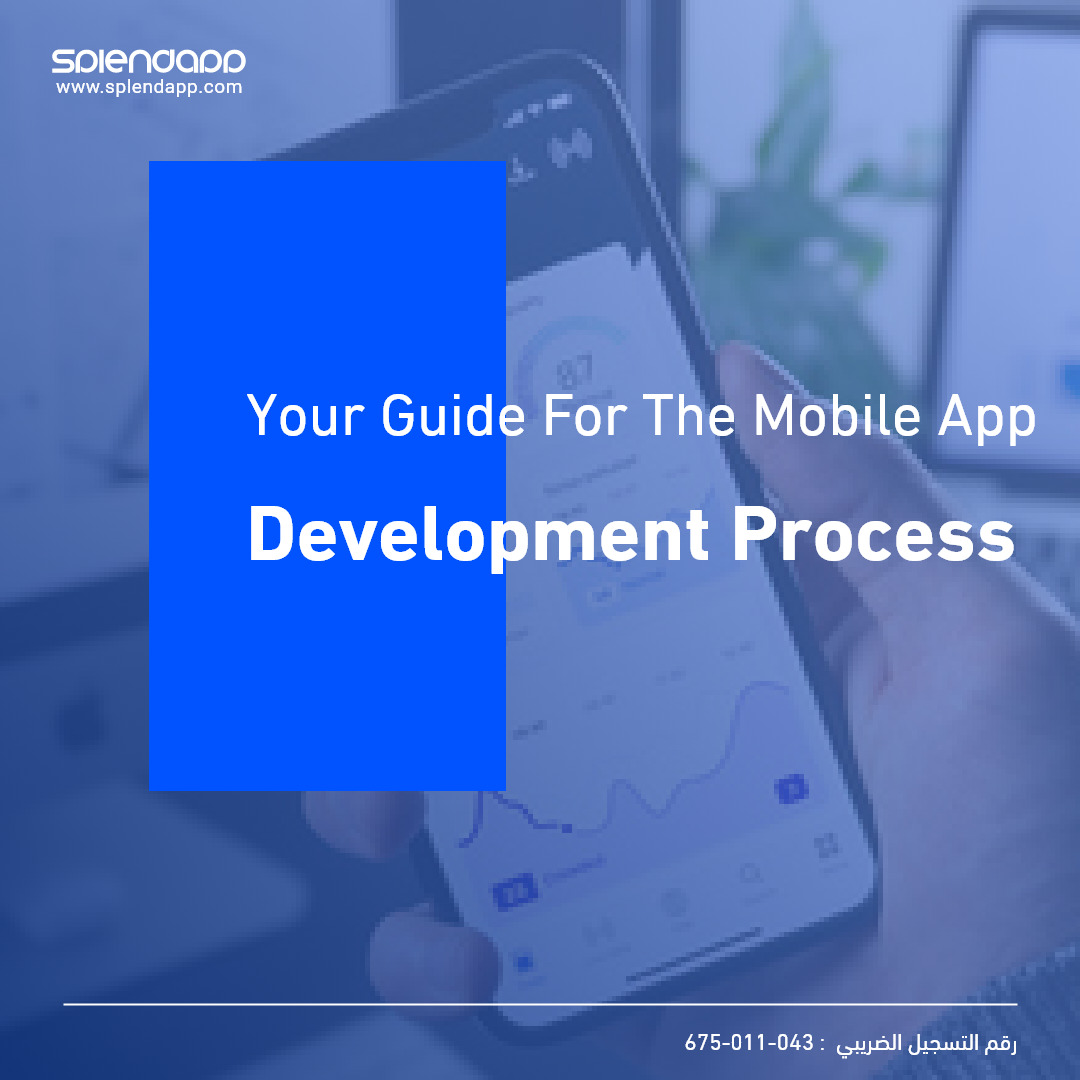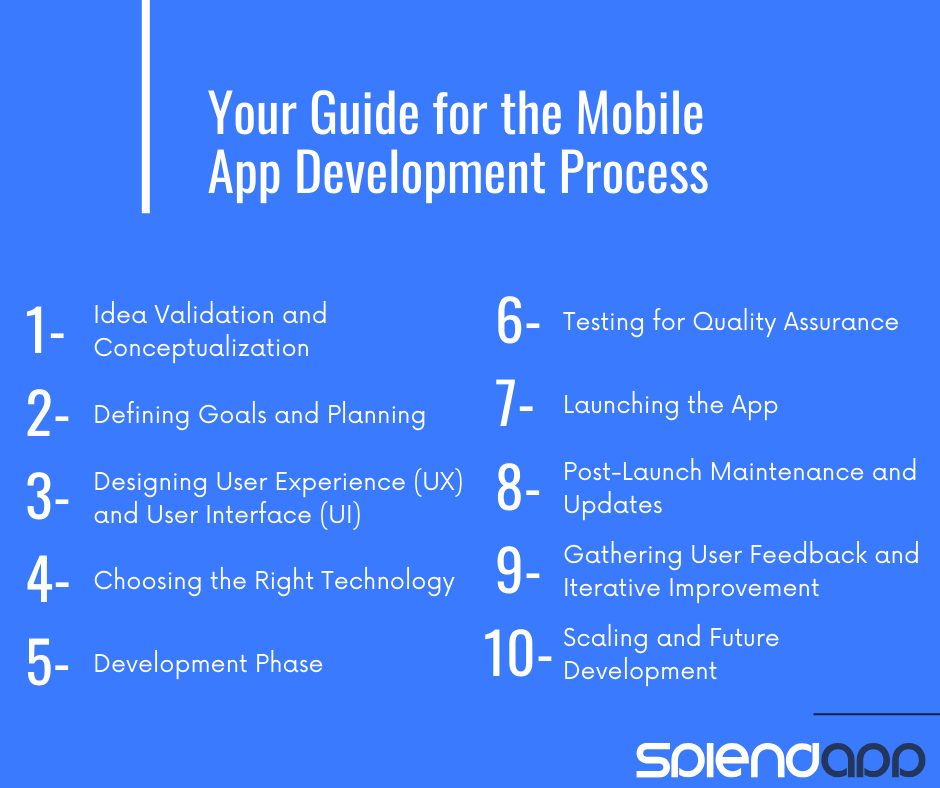

The Mobile App Development Process is a comprehensive journey that involves several key stages, each integral to the creation of a successful mobile application. This process merges technical expertise with creative design and strategic planning, aiming to produce an app that is not only functional but also engaging for the end-user.

Creating a mobile app can be a rewarding venture, both in terms of personal accomplishment and potential commercial success. Here’s a guide to navigate you through the mobile app development process:
1. Idea Validation and Conceptualization
Idea Origination: Start with a unique idea or a solution to a problem.
Market Research: Validate your idea by researching the market, understanding potential users, and studying competitors.
2. Defining Goals and Planning
Setting Objectives: Clearly define what you want your app to achieve.
Resource Planning: Assess the resources required, including budget, tools, and team composition.
3. Designing User Experience (UX) and User Interface (UI)
Wireframing: Create basic outlines of your app’s screens and flow.
Prototyping: Develop a working model of the app to visualize the user journey.
UI Design: Focus on the look and feel of the app, incorporating brand elements.
4. Choosing the Right Technology
Platform Decision: Decide whether to develop for iOS, Android, or both.
Tech Stack: Select appropriate technologies and programming languages based on your app’s requirements.
5. Development Phase
Front-End Development: Code the user interface and client-side interactions.
Back-End Development: Set up servers, databases, and APIs.
Integration: Merge front-end and back-end elements.
6. Testing for Quality Assurance
Functional Testing: Ensure each feature works as intended.
Performance Testing: Check the app’s responsiveness and stability.
Security Testing: Protect user data and app integrity.
User Acceptance Testing (UAT): Test with actual users for feedback.
7. Launching the App
Pre-Launch Checklist: Confirm compliance with app store guidelines.
Deployment: Release the app on platforms like the Apple App Store or Google Play Store.
Marketing Strategies: Implement marketing and promotional activities.
8. Post-Launch Maintenance and Updates
Monitoring: Track app performance and user feedback.
Regular Updates: Roll out updates to fix bugs, improve features, and add new content.
9. Gathering User Feedback and Iterative Improvement
User Feedback: Actively seek user input for improvements.
Iterative Development: Continuously refine the app based on feedback and emerging trends.
10. Scaling and Future Development
Scaling Up: Expand your app’s capabilities as your user base grows.
Adapting to Change: Stay updated with new technologies and user expectations.
The Mobile App Development Process is crucial for several reasons, both from a business perspective and a user engagement standpoint. Understanding its importance can help you appreciate the effort and resources invested in creating a successful mobile application. Here are key points highlighting the significance of this process:
Addressing User Needs: The process begins with understanding and addressing user needs, which is fundamental to creating an app that is relevant and valuable to its target audience.
Market Positioning: Through careful planning and research, the development process helps in strategically positioning the app in the market, distinguishing it from competitors.
Quality Assurance: A structured development process ensures that the app is tested rigorously, leading to a high-quality, reliable, and user-friendly product.
Innovation and Creativity: This process allows for the exploration of innovative ideas and creative solutions, which can lead to the development of unique and engaging apps.
Technical Robustness: It ensures the technical viability of the app, focusing on aspects like performance, security, and scalability, which are crucial for user retention and trust.
Business Growth and Monetization: For businesses, the app development process is a pathway to new market opportunities, customer engagement, and revenue streams (like in-app purchases, subscriptions, or advertising).
Brand Building: A well-developed app can significantly enhance brand image and recognition, providing a direct channel for businesses to engage with their customers.
User Experience Optimization: The process places a strong emphasis on UX/UI design, which is essential in creating an intuitive and enjoyable user experience.
Adaptability and Future-proofing: The development process involves designing apps that are adaptable to future technological changes and user demands, ensuring long-term viability.
Data Insights and Feedback: Post-launch, the process provides valuable insights through user data and feedback, which are crucial for continuous improvement and alignment with user expectations.
In conclusion, the Mobile App Development Process is a multifaceted and dynamic journey that goes far beyond mere technical execution. It embodies a blend of creativity, strategy, user-centric design, and continuous innovation. This process is pivotal in bridging the gap between user needs and technological capabilities, creating digital solutions that are not only functional but also engaging and relevant in today’s mobile-first world.
You can Know more about the upcoming Trends in the Mobile App Industry to help you in your Mobile App Development Process